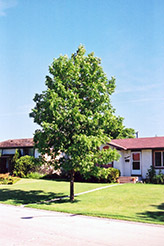* This is a "special order" plant - contact store for details
Height: 45 feet
Spread: 25 feet
Sunlight:
![]()
Hardiness Zone: 2a
Description:
An uncommon native shade or street tree with an upright, open habit of growth; makes a good shade tree for smaller landscapes, relatively clean and low maintenance, very adaptable to diverse conditions
Ornamental Features
Black Ash has dark green deciduous foliage on a tree with an upright spreading habit of growth. The pointy compound leaves turn yellow in fall.
Landscape Attributes
Black Ash is a deciduous tree with a strong central leader and an upright spreading habit of growth. Its average texture blends into the landscape, but can be balanced by one or two finer or coarser trees or shrubs for an effective composition.
This is a relatively low maintenance tree, and should only be pruned in summer after the leaves have fully developed, as it may 'bleed' sap if pruned in late winter or early spring. Deer don't particularly care for this plant and will usually leave it alone in favor of tastier treats. It has no significant negative characteristics.
Black Ash is recommended for the following landscape applications;
- Shade
Planting & Growing
Black Ash will grow to be about 45 feet tall at maturity, with a spread of 25 feet. It has a high canopy with a typical clearance of 7 feet from the ground, and should not be planted underneath power lines. As it matures, the lower branches of this tree can be strategically removed to create a high enough canopy to support unobstructed human traffic underneath. It grows at a medium rate, and under ideal conditions can be expected to live for 70 years or more.
This tree should only be grown in full sunlight. It is quite adaptable, prefering to grow in average to wet conditions, and will even tolerate some standing water. It is not particular as to soil type or pH. It is somewhat tolerant of urban pollution. This species is native to parts of North America.
* This is a "special order" plant - contact store for details

